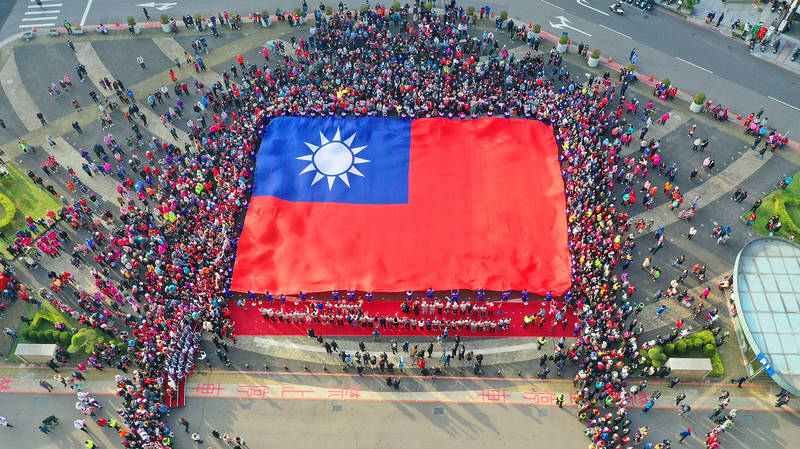《TAIPEI TIMES》Majority identify as Taiwanese: Pew

A Republic of China flag is pictured in front of Taoyuan City Hall on Jan. 1. Photo courtesy of the Taoyuan City Government
ACROSS THE STRAIT: DPP and KMT supporters alike consider China a major threat to Taiwan, but the former are more likely than the latter to say this, Pew Research found
Staff writer, with CNA
More than two-thirds of Taiwanese see themselves as primarily Taiwanese, while only a small number consider themselves as primarily Chinese, a report released by the US Pew Research Center on Tuesday showed.
In a survey examining how people in Taiwan feel about their identity and how they view China, the institute found that only 3 percent of people in Taiwan think of themselves as primarily Chinese.
Meanwhile, 67 percent think of themselves as primarily Taiwanese, and 28 percent identify as both Taiwanese and Chinese, it said.
Adults younger than 35 are particularly likely to identify as solely Taiwanese (83 percent), while women (72 percent) are more likely than men (63 percent) to do so, it said.
The report highlighted how identity in Taiwan is tied to politics and how those who consider themselves primarily Taiwanese are more likely to align themselves with the Democratic Progressive Party (DPP).
Meanwhile, those who regard themselves as both Chinese and Taiwanese, or as primarily Chinese, are more likely to be aligned with the Chinese Nationalist Party (KMT), the report said.
Furthermore, 40 percent of respondents said they have an emotional connection to China, including 11 percent who feel very emotionally attached, it showed.
About seven in 10 adults who support the KMT say they have an emotional attachment to China, while only about two in 10 of those aligned with the DPP said the same, the report showed.
In addition, older adults in Taiwan are more likely to have an emotional attachment to China.
Forty-six percent of those aged 35 and older report an emotional connection with China, while 26 percent of those younger than 35 said the same, it showed.
Regarding cross-strait issues, most people in Taiwan consider China’s power and influence a threat, the report said.
This includes 66 percent who labeled China as a major threat, more than those who said the same about the power and influence of the US (45 percent) and Russia (25 percent).
Younger adults are more concerned about China’s power and influence than older adults, as are those who are more highly educated, it said.
Even among adults in Taiwan who identify as primarily Chinese, or Taiwanese and Chinese, 64 percent of them consider China’s power and influence to be a threat.
Similarly, 58 percent of adults who say they are emotionally attached to China see its power and influence as a threat.
DPP and KMT supporters alike consider China a major threat to Taiwan, but DPP supporters (78 percent) are more likely than KMT supporters (59 percent) to say this, the report showed.
Conversely, KMT supporters (63 percent) are more likely than DPP supporters (34 percent) to see the US as a major threat to Taiwan.
Earlier research found that DPP supporters favor the US over China, while KMT supporters favor China over the US, the report added.
Regarding life satisfaction, few in Taiwan are happy with how things are going, with 24 percent expressing satisfaction, while 32 percent said they were dissatisfied and 37 percent were neither satisfied nor dissatisfied, it said.
Responses to this question were highly partisan. About half of those who support the DPP (48 percent) were content with how things are going, compared with 10 percent of those who support the KMT, the report said.
Those who consider themselves primarily Taiwanese are more likely to express satisfaction with how things are going in Taiwan, similar to those who have less of an emotional connection to China, it said.
The data came from a telephone survey of 2,277 adults in Taiwan from June 2 to Sept. 17 last year. It had a confidence level of 95 percent and a margin of error of 2.64 percentage points.
新聞來源:TAIPEI TIMES



















